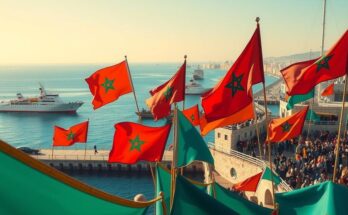Tunisia’s presidential election is marred by political repression, with incumbent President Kais Saied facing little opposition due to the imprisonment or exclusion of significant candidates. This election is pivotal, as it highlights the national struggles around governance and a floundering economy. The political landscape, having seen Saied consolidate power since 2021, suggests a low turnout and challenges to legitimacy, with calls for a boycott from major opposition groups. Economic distress and migration issues continue to plague the country, adding to the complexities surrounding Saied’s governance and Tunisia’s democratic prospects.
Tunisia held its presidential election against a backdrop of significant political repression, with incumbent President Kais Saied poised to secure re-election with minimal challenge. Opposition leaders are largely absent from the ballot, many having been imprisoned or politically sidelined, casting a shadow over the electoral process. Five years prior, President Saied emerged victorious by capitalizing on an anti-establishment sentiment in a nation that had been celebrated as a bastion of democratic progress following the Arab Spring. As Tunisia approaches this election, it struggles with important issues that include economic turmoil and a fracturing democratic landscape. While Saied remains a figure of loyalty among some supporters, his rise to power has been characterized by controversial actions that he has taken since declaring a state of emergency in 2021. This declaration, which included suspending parliament and revising the constitution to centralize authority, has drawn widespread condemnation from pro-democracy advocates and led to the arrest of numerous dissenters. The election introduces an opportunity to assess public sentiment regarding Saied’s governance, yet the absence of credible opponents raises questions about its legitimacy. Among the three recognized candidates are Saied himself, Zouhair Maghzaoui, and Ayachi Zammel, the latter of whom is facing legal troubles. Many would-be candidates have been barred from participation, including notable opposition figures who have been jailed. The National Salvation Front, a coalition of political parties, has denounced the election process as deceptive and has called for a boycott. The economy remains another pressing issue for Tunisia, with an unemployment rate soaring to 16%, particularly effecting youth. Saied’s administration has struggled to offer a coherent economic strategy, leading to stagnation and a reliance on international financial assistance. Additionally, migration issues have escalated, with many Tunisians attempting perilous journeys to Europe amid deteriorating local economic conditions.” Further exacerbating the situation are Saied’s inflammatory remarks associating migrants from sub-Saharan Africa with crime, which has resulted in violent backlash and increased security operations against these communities. Despite maintaining relationships with key Western allies, Tunisia under Saied has been expanding ties with non-Western powers, while balancing complex challenges.
Tunisia’s 2023 presidential election unfolds within a context of significant political unrest and repression. Following the Arab Spring’s promise of democracy, the nation has witnessed increasing consolidation of power by President Kais Saied, resulting in a political landscape predominantly devoid of meaningful opposition. With basic rights curtailed and opposition figures frequently imprisoned, the legitimacy of electoral processes is severely undermined. The socio-economic landscape remains bleak, with high unemployment rates influencing migration trends and prompting harsh governmental responses to demographic shifts. These factors contribute to the diminishing public trust in political institutions and electoral processes, rendering the 2023 election pivotal for Tunisia’s future political trajectory.
In conclusion, Tunisia’s 2023 presidential election reflects a deeply flawed democratic process, with incumbent President Kais Saied facing few credible challenges amidst a landscape rife with political repression. The imprisonment of major opposition leaders and the recent history of authoritarian governance have overshadowed the electoral event, raising concerns over legitimacy and representation. The economic challenges faced by the nation, coupled with societal unrest related to migration and governance, further complicate Tunisia’s prospects for a prosperous democratic future. The outcome of this election may very well dictate the trajectory of Tunisia in the coming years, as both domestic and international observers remain vigilant regarding the implications of Saied’s extended rule.
Original Source: www.euronews.com




